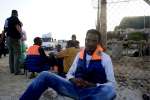Italian authorities confirm the deaths of 14 people on board a boat carrying hundreds of refugees
News Stories, 29 July 2015
MESSINA, Italy, July 29 (UNHCR)- Italian authorities have confirmed the deaths of 14 people on board a boat carrying hundreds of refugees and migrants across the Mediterranean on Tuesday, July 28th.
According to officials, 456 people are known to have survived and were rescued during an operation conducted by an Irish naval patrol. Among the survivors are several dozen children. The deceased and most of the survivors have been brought to shore to the Italian port of Messina.
The nationalities of those who died have not yet been confirmed. Autopsies will now be carried out on the island of Sicily to determine the exact cause of death.
However, several of the survivors from the vessel have told UNHCR they believe those who died may have suffocated after being forced to travel inside the hull of the boat.
The sea rescue took place in the Mediterranean on the afternoon of July 28, after the Irish naval vessel L.E. Niamh responded to a distress call. The Irish navy has reported that the survivors were discovered on a boat roughly 80 km north of the Libyan coast.
To date in 2015, more than 2,000 refugees and migrants are estimated to have died or gone missing at sea while attempting the perilous crossing of the Mediterranean. More than 1,300 people died in the month of April alone, prompting a number of European leaders to agree on a plan to triple the amount of money devoted to sea rescues.
Many states also committed significant resources and naval rescue ships. In addition, these efforts have been greatly enhanced by the involvement of private and other non-governmental initiatives, including one launched by Médecins Sans Frontières (MSF) and the Migrant Offshore Aid Station (MOAS), a private philanthropic enterprise. All these measures have had a positive impact in reducing loss of life.
According to the Irish Navy, L.E. Niamh has now been involved in the rescue of more than 1,200 people as part of Ireland's contribution to the refugee crisis in the Mediterranean.
By Owen Fay





































